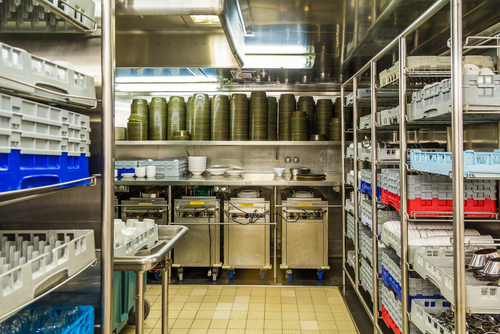What Are The Different Divisions of Commercial Kitchens, And How To Set Up One?
>> Feb 18, 2016
We all know what a
kitchen is. At home, it is that one special room where delicious dishes are
made. Kitchens bear a lot of meaning in the food industry as well. Remember
your favorite restaurant by the street corner? Right from choosing the cabinets
to creating a well-integrated lighting and storage arrangement, you need to
devote much time to the interior decoration of any commercial kitchen. But at
the same time, you must also remember to make the kitchen
hygienic so that most works can be carried on without any contamination.
Commercial
style kitchens can be divided in to the following sections:
- Clean up stations – This is where you will do all the cleaning up. Industrial style dishwashers are meant to clean plates, cutleries, pots, and just about everything else.
- Prep station – This is where you will plan your recipes. Cut the fruit, vegetable and meat. Marinade the meat.
- Hot station – This is where all your ovens and cooktops are. This is where the cooking happens.
- Computer station – Orders are displayed on the computer screen.
- Plating station – This is where all the dishes are plated up and ready to serve.
How
do you set up a commercial style kitchen? Where would you begin?
1. Buy a walk-in refrigerator: A walk-in refrigerator is a cold
storage unit, used to maintain the standard temperature of -2 to 4°C.
2. Buy an industrial grade freezer: These are industry standard
freezers. They come in single, double or triple-door units and if you have a
commercial outlet, these fridges can be used to store vegetables, fruits and
ice on a large scale.
3. Buy a refrigerated cooking
line/station and accompanying refrigeration units:
This is a type of
preparation unit, where the type of food you are preparing should be maintained
in a cool temperature.
4. Purchase and install storage shelves
and cabinets:
Purchase different types of storage shelves, trolleys for dry storage,
equipment storage and for storing perishable and non-perishable food items.
5. Purchase and install all the
required cooking equipment.
- Buy and install an industrial grade kitchen hood and an H-VAC ventilation system: Kitchen hoods are very important especially in an industrial kitchen. They pull out all the heat, fumes, smoke and other carcinogenic soot that are released during cooking, out of the kitchen and the building.
- Buy and install a boiler, industrial salamander, gas-range and oven: Depending on the type of food prepared, you would need to install a boiler (a grill to cook meat), salamanders (for keeping plated food hot), and gas-range and oven.
- Purchase accompanying appliances depending on the food type and size of the food: Depending on the cuisine served, you might need to get deep fat fryers, a flat grill or a conventional oven.
- Install a prep table: Install a stainless steel prep table. This is essential for a commercial kitchen.
- Buy required appliances: Buy knives, meat slicers, food processors and industrial grade mixers, depending on your requirements.
- Install sprinkler systems and fire extinguishers.
Are all commercial
kitchens alike? The answer is no; they are not alike. Commercial kitchens work
by having a number of cooking stations that have the appropriate equipment. At
present, there are many customized and even foldable options that you can
incorporate as part of commercial kitchens. You can simply call the kitchen design professionals to get
the best installation. They will also suggest to you about the maintenance.
The Head Chef will also decide the philosophies and techniques that will run
the kitchen.













2 komentar:
Great post! Have a happy day!
It is appropriate time to make some plans for the future and it is time to be happy.
I've learn this post and if I could I wish to counsel you some
fascinating things or suggestions. Perhaps you can write next articles relating to
this article. I desire to learn even more things about it!
Post a Comment